Dell XPS 15 L521X: A Detailed First Look
by Jarred Walton on July 25, 2012 1:10 AM ESTDell XPS 15 General Performance
We start as usual with our general performance application benchmarks. We’re reaching the point where we now have quite a few notebooks in our updated Mobile Benchmark suite, and we’ve tried to select some reasonable comparison points. Given the preliminary nature of our benchmark results (i.e. potential for CPU and/or GPU throttling), we have not yet added the XPS 15 to Mobile Bench, but we will do so when we have a final release BIOS that addresses our throttling concerns. Here’s the list of laptops we’ll be using for our charts, along with a brief overview of their specs. The full specs for each laptop can be found in their respective reviews, which we’ve linked in the table below.
| Laptop Configuration Overview | ||||
| Laptop | CPU | Graphics | Storage | Battery |
| Acer Aspire V3-571G | Intel i7-3610QM | GT640M/HD4000 | HDD | 48Wh |
| Acer Aspire S5 | Intel i7-3517U | HD4000 | SSD | 35Wh |
| Acer TimelineU M3 | Intel i7-2637M | GT640M/HD3000 | SSD | 55Wh |
| AMD Trinity Prototype | AMD A10-4600M | HD7660G | SSD | 56Wh |
| ASUS N56VM (Prerelease) | Intel i7-3720QM | GT630M/HD4000 | HDD/SSD | 56Wh |
| ASUS G74SX-A2 | Intel i7-2630QM | GTX560M/HD3000 | SSD | 90Wh |
| Clevo W110ER | Intel i7-3720QM | GT650M/HD4000 | Hybrid (Seagate) | 62Wh |
| Dell XPS 15 (L521x) | Intel i7-3612QM | GT640M/HD4000 | Hybrid (SRT) | 65Wh |
| Razer Blade | Intel i7-2640M | GT555M/HD3000 | SSD | 60Wh |
| Sony VAIO SE | Intel i7-2640M | HD6630M/HD3000 | HDD | 49Wh |
| Toshiba P755D | AMD A8-3520M | HD6620G | HDD | 47Wh |
We have quite a few SSD-equipped laptops in our list, which will mostly influence PCMark results. The Dell XPS 15 we’re reviewing marks the first time—and certainly won’t be the last!—we’ve had a laptop arrive with support for Intel’s Smart Response Technology. Previously SRT was only available with the desktop Z68 chipset, but with the new Ivy Bridge Panther Point chipsets (see the chipset table at the bottom of our IVB Ultrabook review) laptops with 7-series chipsets (excluding the HM76) all support SRT. Dell uses a Samsung P830 32GB mSATA SSD for SRT caching, and we enabled the higher performing “Maximized” mode with write-back caching as opposed to the lower performing “Enhanced” mode with write-through caching. There is an increased risk of data loss in the event of hardware removal or failure, but HDD removal is highly unlikely to occur on the XPS 15 and in the case of hardware failure there’s already a high chance of data loss. (We always recommend users back up, and back up often!) Note that a system crash doesn’t cause data loss—the Intel BIOS hooks detect an improper shutdown with “unsaved” data in the SSD cache, and that data is then committed to the hard drive on the next boot—it’s actually quite slick.
The other hybrid storage solution that we’ve seen more often is Seagate’s Momentus XT, which has an 8GB cache that AFAIK only functions in write-through caching mode. Going forward, we’ll also see some laptops using alternative caching schemes like Diskeeper/Condusiv Technologies’ ExpressCache software. I do have a laptop undergoing testing right now with an 8GB ExpressCache implementation, and it appears to be less performant than a 32GB SRT cache, but given the discrepancy in SSD size it’s difficult to come to any firm conclusion at this point.
Now let’s get to the benchmark results, starting with PCMark. We ran the XPS 15 in both IGP and dGPU modes, as the presence/lack of Intel’s Quick Sync technology can have a sizeable impact on overall performance according to this metric. We’ve used the best score for each chart on previously testing laptops (e.g. IGP for the Computation results). The XPS 15 results are in green, with the similarly equipped Acer V3-571G results in yellow. We also have results for the ASUS N56VM/N56VZ prototype with both HDD and SSD (light blue) storage, so you can get a feel for the range of performance that the storage solution creates. Note that while the overall design is highly reminiscent of Apple’s current MacBook Pro 15, we do not have current MBP15 Boot Camp results—and anecdotally it appears there is very little cross shopping; people either want an MBP with OS X, or something else with Windows. If/when Anand or Vivek gets around to testing the latest MacBooks with Windows, we’ll add the results to Mobile Bench.
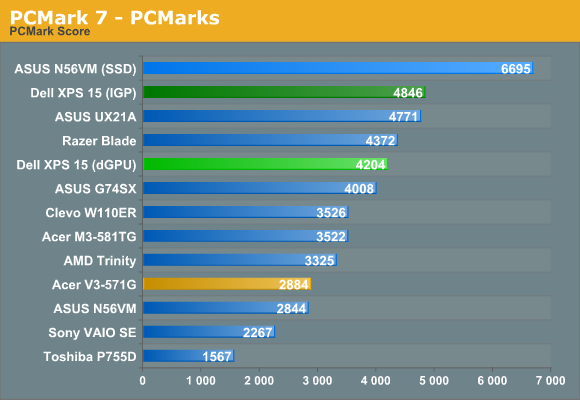
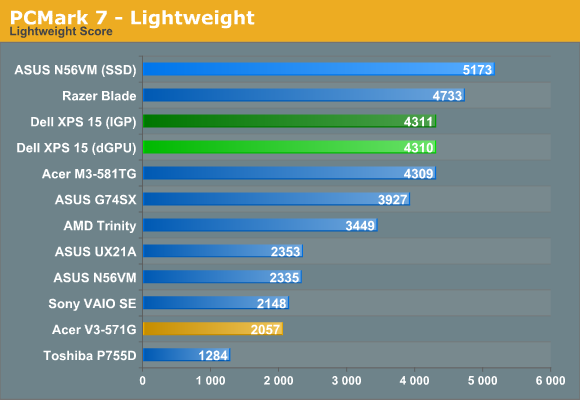
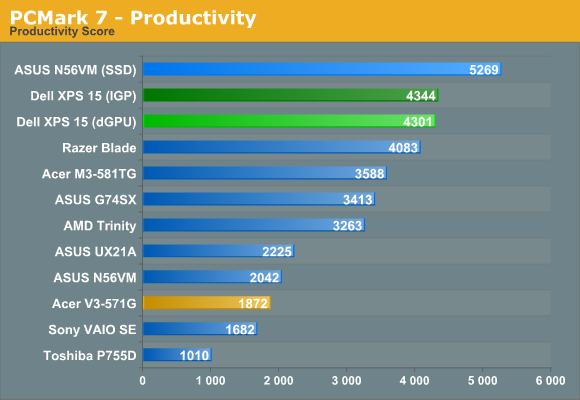
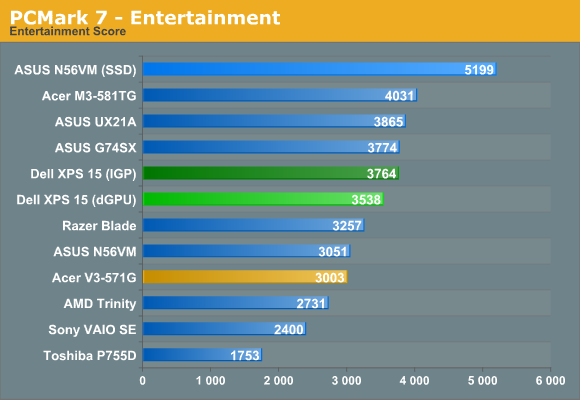
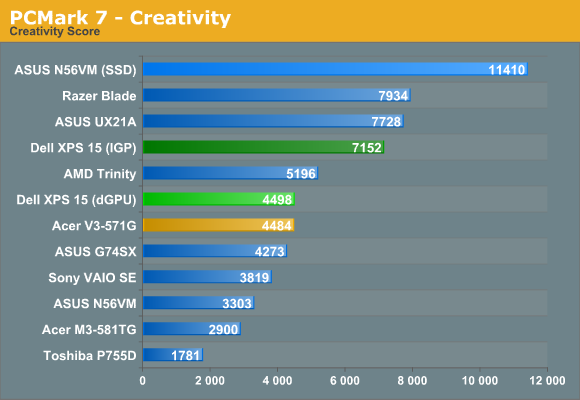
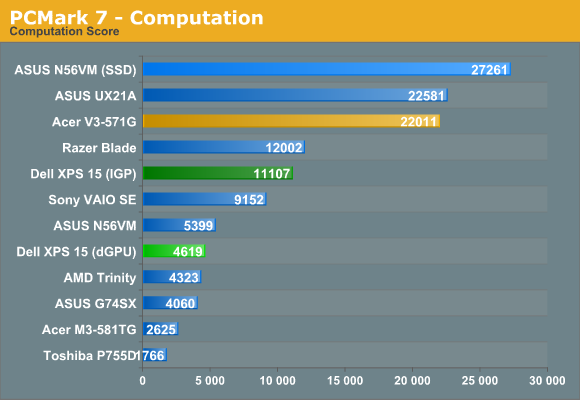
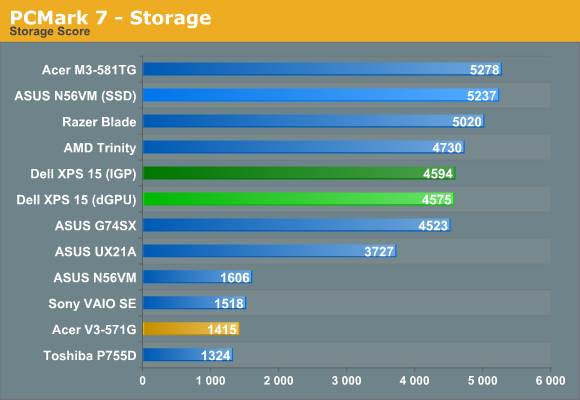
Starting with PCMark 7, our results are actually somewhat surprising. The hybrid Seagate Momentus XT storage in the Clevo W110ER doesn’t improve scores all that much over a typical hard drive (if you can call 25% “not that much”), whereas the 32GB SRT solution in the XPS 15 looks to improve performance by around 75% over an HDD. Of course, if you make the switch to a pure SSD solution (e.g. look at the N56VM scores), PCMark 7’s overall score improves by 135%. That pretty much establishes the expected storage hierarchy: SSD > HDD + SSD Cache > Hybrid HDD > HDD.
There are a few other oddities in the PCMark 7 results worth noting. Both the Creativity and Computation suites benefit tremendously from Intel’s Quick Sync technology. For whatever reason (we tried both the 2696 and 2761 Intel drivers, with similar scores in both cases), the XPS 15 results don’t seem to be in line with other Ivy Bridge laptops. In particular, note how the other three IVB laptops (N56VM, UX21A, and V3-571G) all post Computation scores in excess of 20000, while the XPS 15 has to “make do” with a score of only 11000. This may be yet another instance where throttling is affecting the results, so we’ll wait for updated firmware before trying to draw any final conclusions.
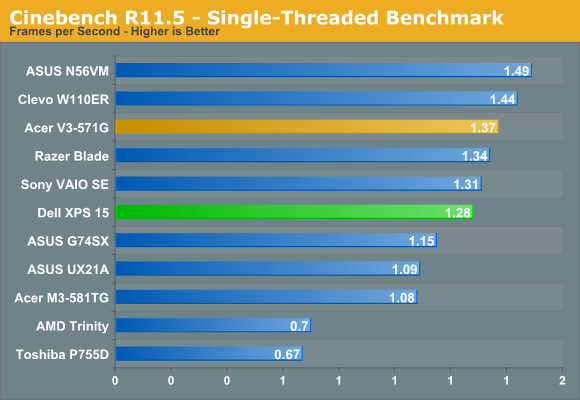
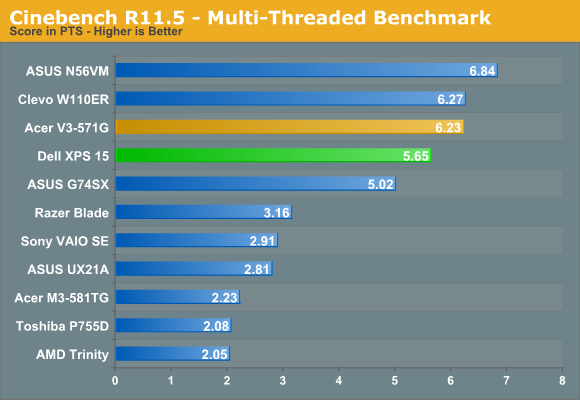
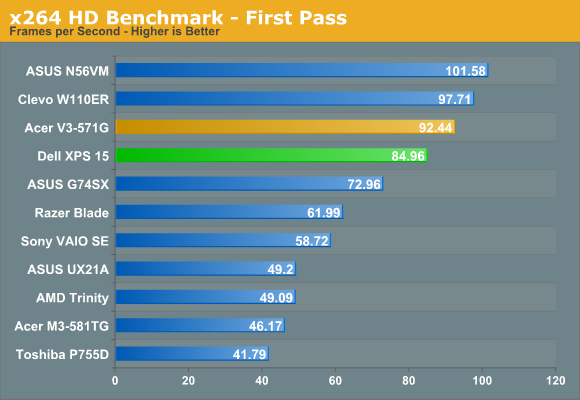
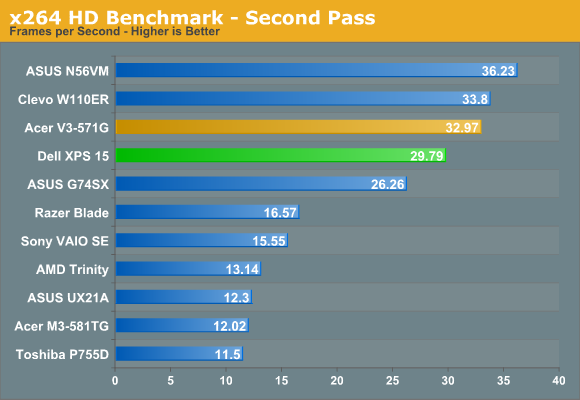
Our CPU-centric tests put the XPS 15 and its 35W i7-3612QM right about where you’d expect. It’s faster than any dual-core processor and outperforms the quad-core Sandy Bridge chips, but it’s a slight step down from the standard voltage 45W IVB quad-cores. Throttling of CPU clocks did not occur during these tests, so it’s only when the CPU and GPU are carrying a significant load the throttling is triggered. As far as we can tell, with the current A04 BIOS, the Dell XPS 15 can pretty much loop a workload like the Cinebench SMP test indefinitely and remain at the maximum Turbo Boost clock (though that may change with updated firmware).
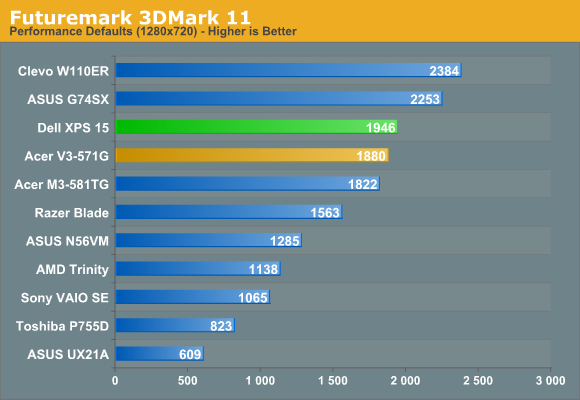
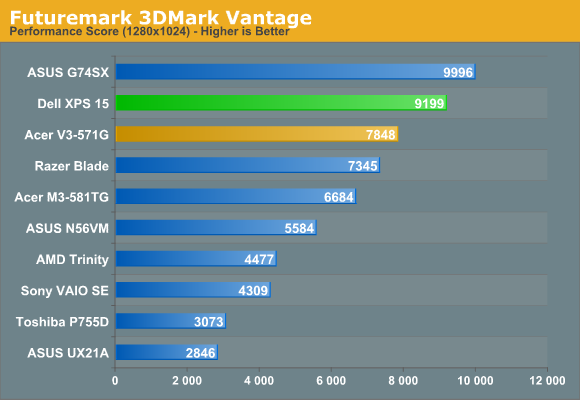
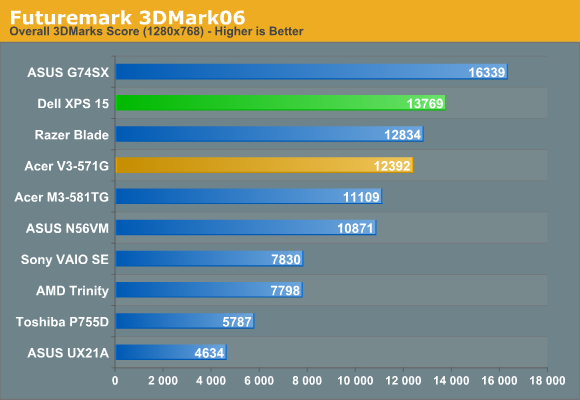
3DMark results also put the XPS 15 and its GDDR5-equipped GT 640M right where you’d expect. It’s a step up in performance over the DDR3-equipped GT 640M in the Acer V3-571G, and it also beats the previous generation GT 555M in the Razer Blade. Meanwhile, the GTX 560M can still win in our synthetic graphics tests, and the GT 650M with GDDR5 also outperforms the XPS 15. There are no real surprises here, but as noted several times already, throttling may be affecting these results—and it’s definitely a factor in the gaming results, which we’ll get to next.










109 Comments
View All Comments
xype - Wednesday, July 25, 2012 - link
Never said it was the pinnacle. But feel free to educate me how above industry average growth is "struggling" or, alternatively, show me some data for the past 5 years that shows Apple’s sales dipping lower than those of their competitors.Unless, for some reason, Apple gets paid with magic dollars that increase their value after Apple receives them, their PC profits do not come about from "struggling".
But hey, since you told me, I’m gonna get a real hard grip on my desk now while you look for data to support your claims. Wheee!
ananduser - Wednesday, July 25, 2012 - link
Above average industry growth ? You should check Lenovo and Asus' numbers for above average growth, double digits. For the most recent quarter Apple stagnated.xype - Thursday, July 26, 2012 - link
Ugh. Yeah, most recent quarter. That totally negates the past, what, 5 years? Apple is doomed! o_Oananduser - Thursday, July 26, 2012 - link
I didn't say that. You seem to extract Apple out of the PC landscape like they were pushing PowerPC hardware. Not anymore. Ever since they switched to Intel their growth was steady but small. So no Apple does not have above average industry growth. Other PC OEMs do.CeriseCogburn - Sunday, July 29, 2012 - link
Hey you got overconfident and he upped the ante and provided the heat that destroyed your smug appletude.The least you should have done is take it like an appleseed, but instead you smarted off and made up a sucky strawman.
tsk tsk, Steve is disappointed. You're fired.
yyrkoon - Wednesday, July 25, 2012 - link
Except, those "PC makers" who are "retards" actually contribute to the technology specifications. For hardware used in your precious Apple systems.x86-64 CPU's /chipsets, nVidia graphics cards, SATA, PCIe, Thunderbolt, , etc, etc.
Matter of a fact. Apple did not even make the first laptop. Epson 1981, Microsoft 1982, Compaq 1988, IBM 1984, Radio Shack 1983 ( In collaboration with Microsoft ), and possibly NEC 1989 all had designs before Apple in 1989. Not to mention others dating back to 1979.
So who is thinking "differently" again ? Do not even get me started on OSX.
So, if not for the technology giants of the world. Apple would not even have existed. Like many others in the industry, they take the ideas from others, and improve on them. Improvement is also a subjective term in this situation.
xype - Thursday, July 26, 2012 - link
Who contributes to technology specifications? Dell? Asus? Acer? HP?Did Intel start targeting the ultra-low-power CPU specs because of all of these guys, who made the first "Ultrabook"?
And how "special" do you have to be to think I was claiming Apple made the first laptop? Duh?
Unibody aluminium enclosures, retina display, the ultrabook form factor, thunderbolt, etc are not popping up in Acers and Asuses and Dells first. I’m NOT claiming Apple is the end all be all (as some specialitos here seem to think), but they DO contribute their share to the ecosystem and claiming they don’t and that they are just "assembling" PC parts is reeking of butthurt, especially seeing how HP and now Dell seem completely unable to make "premium" laptops that don’t looks like MacBook knock-offs.
Which is my original point: it’s annoying that they don’t, because people are not buying only Macs and it would be really nice to have some hardware that actually looked different. They just don’t give enough of a shit.
yyrkoon - Friday, July 27, 2012 - link
The point was. Apple does currently makes a system that is based on PC ( x86 compatible ) parts. They do not come up with technology ideas. They buy decent / good parts and assemble them. Then they write a limited driver base into their operating system to support such hardware.Which in fact is a good idea, but very limited. General purpose computing, that is limited by software support. For software titles, and additional hardware. Then, it is also very proprietary in comparison to other alternatives. You're locked into their hardware, and software.
The reason why OEM PC vendors "dont give a shit" is that such systems cost a lot, and PC system purchasers are cheap. If you were to compare lets say Dell to Apple. I think you would find that Dell probably sells many more systems *This* is an "Apple" to Apples comparison. Now, as for who actually makes more money . . . I have no idea. Nor do I care.
As far as who actually contributes to PC technology. Try using google. I think you would very likely find Intel, AMD, IBM, supermicro, and Epson among them. Then, many others in the PC industry like Asus.
CeriseCogburn - Sunday, July 29, 2012 - link
A black keyboard area is a scourge on us all.Used to be you could see all laptop keyboards in the dark without back lighting, until the pliable masses were all doggy trained into loving black on everything - now they're just invisible past dusk. Pavlov man - the training is actually amazing.
Yeah, so strike one for the crap black keyboard and area, and I include the mindless drooling dogams in that strike as well.
That's also why they all make maccy looking clones- because the idiot masses respond like clockwork.
yyrkoon - Wednesday, July 25, 2012 - link
Jarred, how about setting processor affinity to 2 cores only ? Then retesting a game or two ? The results should be interesting.I'm thinking that game performance should get a boost, and CPU temps should drop some.